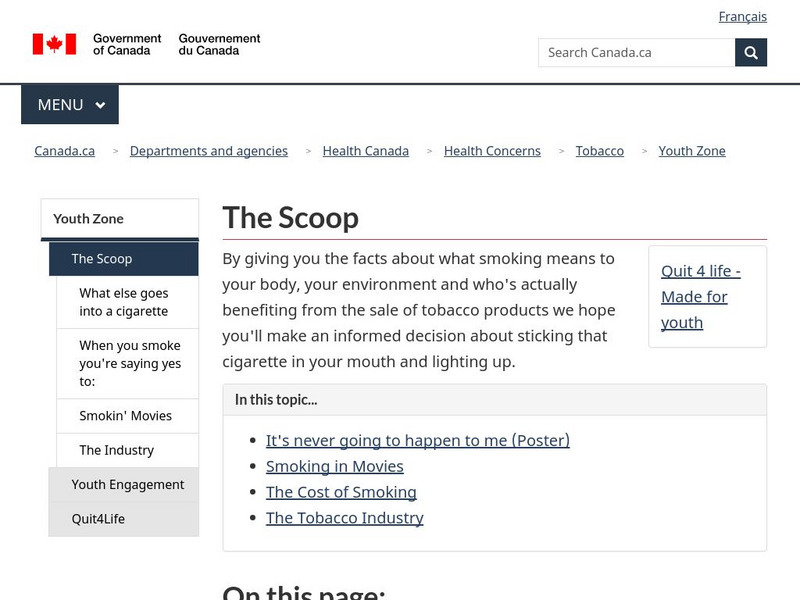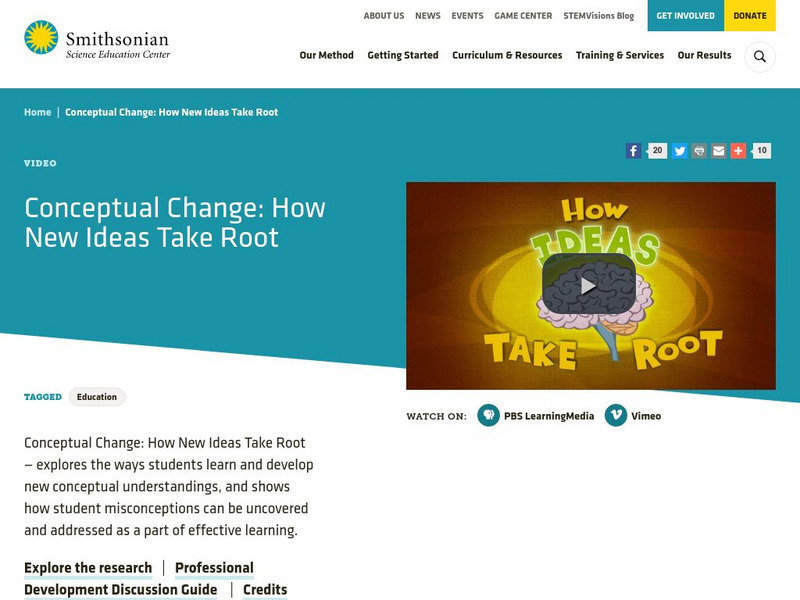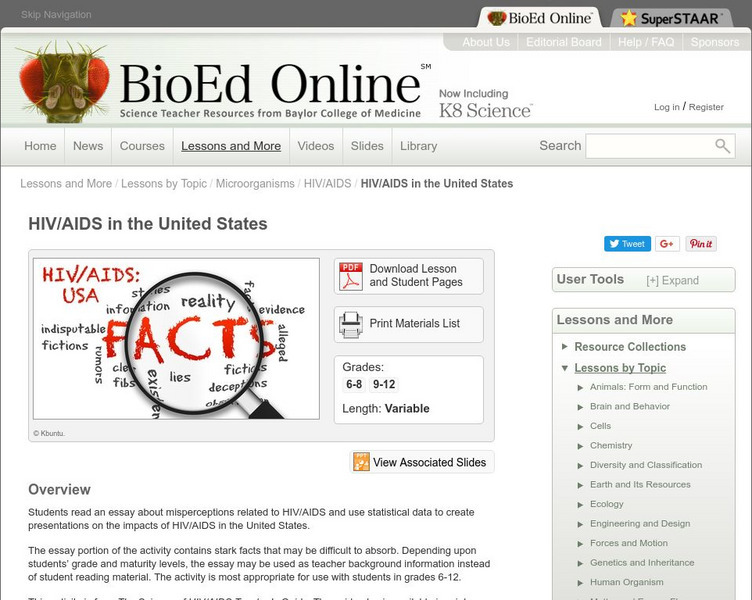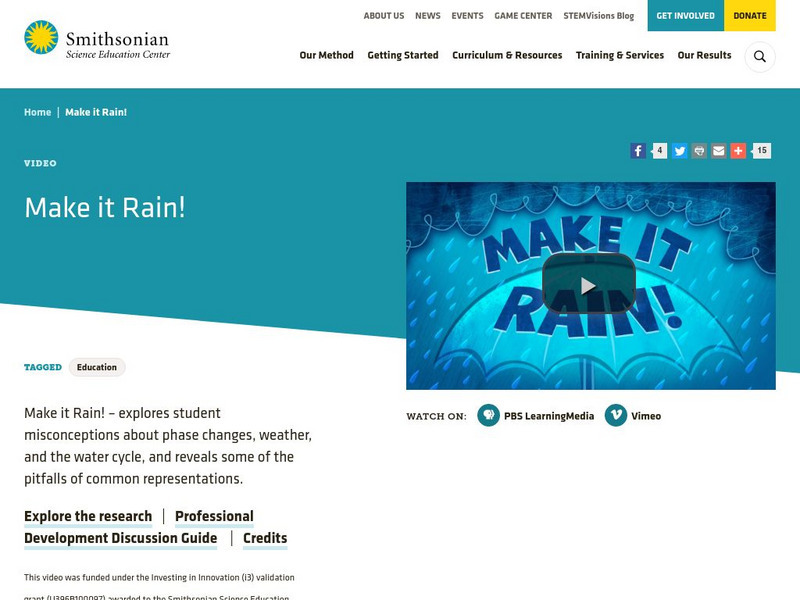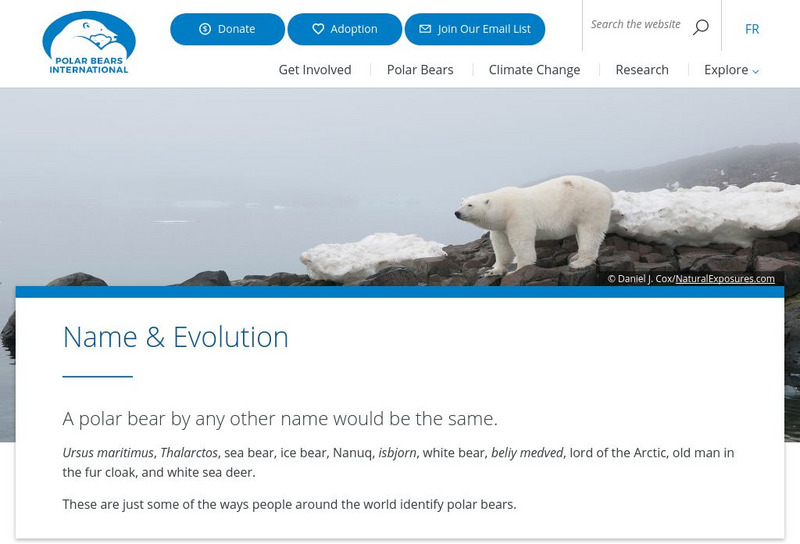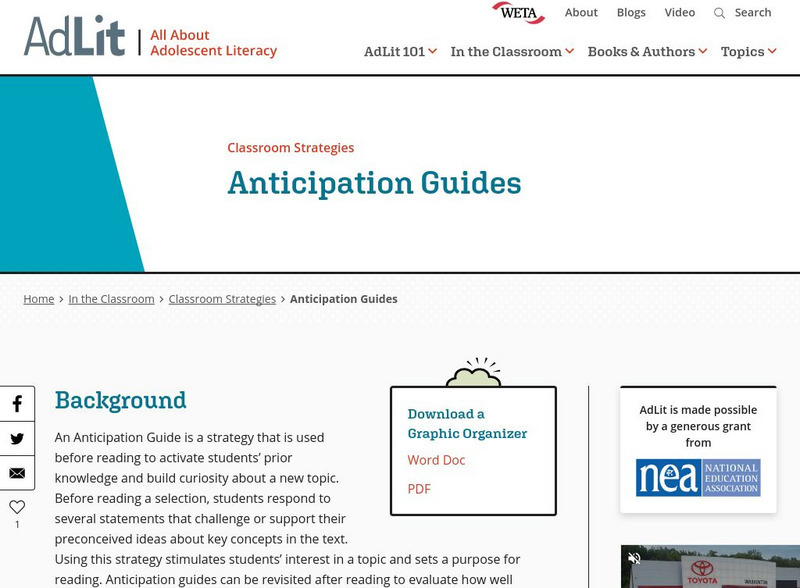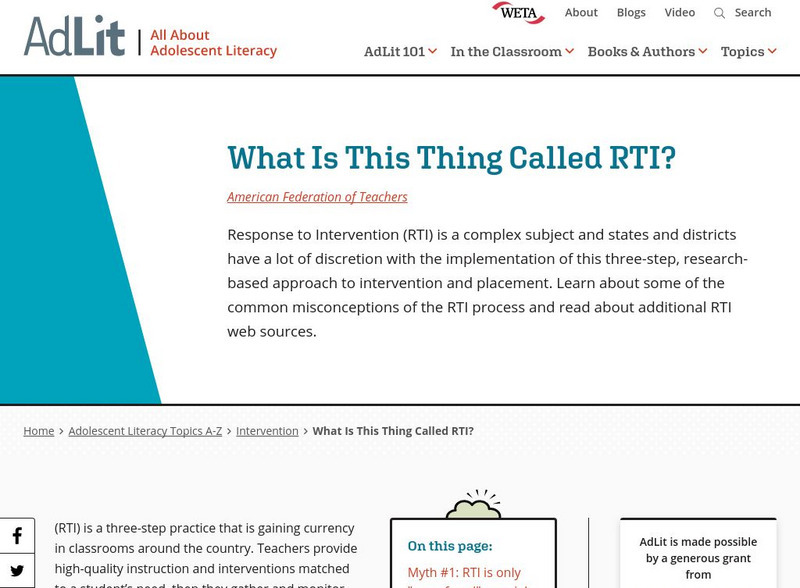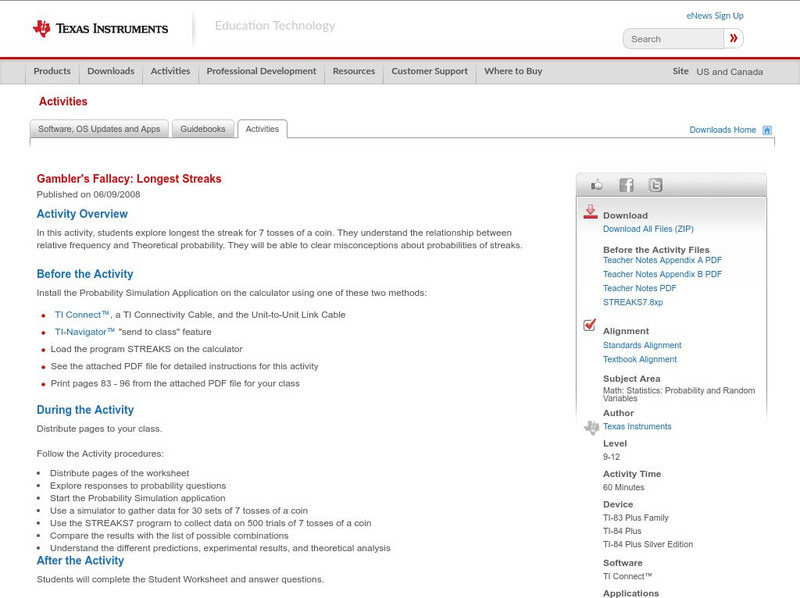NASA
Nasa: Image Science Center: Ask the Space Scientist
A NASA scientist, Dr. Sten Odenwald, answers many students' questions. Topics include planets, galaxies, black holes, the origin of the universe, and common misconceptions about space.
Utah Education Network
Uen: Reasons for the Seasons
Lesson plan addresses misconceptions about seasonal changes and Earth's orbit through a pre-instructional activity survey and follow-up experiments to scientifically study the answers to questions found in the survey. Includes great...
Government of Canada
Health Canada: The Scoop on Smoking
In addition to giving the facts about smoking, this youth-focused resource also deals with many young people's misconception that they are immune from the negative effects of smoking. For instance, smoking reduces the rate of lung growth...
Smithsonian Institution
Smithsonian Science Education Center: Conceptual Change: How New Ideas Take Root
Develop a more nuanced understanding of how student ideas are formed both in and outside of the classroom. By understanding the student's misconceptions on scientific ideas, you can better structure your lesson to be more effective. This...
Annenberg Foundation
Annenberg Learner: Science in Focus Energy: What Is Energy?
A video workshop looking at the concept of energy. Discussions include energy as it is used in everyday language to the complex scientific meaning of energy. Presents common student misconceptions, history, and the importance of energy...
Annenberg Foundation
Annenberg Learner: Science in Focus: Energy: Energy in Food
A video workshop examining how the Sun provides energy for all living things beginning with the process of photosynthesis. Presents current scientific thinking about energy transfer through the food chain as well as ways to deal with...
Other
U.s. Global Change Research Information Office: Global Warming and Climate
Examines climate change, its impacts on people and countries, and policies and practices that countries and individuals can use to make a difference. Includes a section on common misconceptions about climate change.
Other
Plimouth Plantation: Thanksgiving Interactive: You Are the Historian
This site, developed by Plimoth Plantation, offers visitors the chance to use the skills of historians to peel away the layers of myth and misconception surrounding "The First Thanksgiving" and discover what might really have happened...
NOAA
Noaa: Storm Prediction Center: The Online Tornado Faq
What questions do you have about tornadoes? This site addresses, among other things, common safety misconceptions and historic tornadoes, damage facts, and tornado research.
CK-12 Foundation
Ck 12: Photosynthesis Summary
[Free Registration/Login may be required to access all resource tools.] What is photosynthesis? Students will review the process of photosynthesis, the light reaction, and the dark reaction (Calvin Cycle). Common misconceptions will be...
Utah Education Network
Uen: Warm Me Up!
Identify misconceptions that many might have about heat sources.
PBS
Pbs: This Emotional Life: Grief and Loss
A resource on the human experience of grief, whether it is from losing a loved one, or from another type of loss. Explains the physical symptoms one feels, misconceptions about the grieving process, gives examples of different kinds of...
Other
Ohio Public Library Information Center: What's That Snake?
The Ohio Public Library information network provides an extensive tool allowing users to search for snakes by name as well as by narrowing down characteristics until you've located a particular type. Myths, facts, and misconceptions are...
Concord Consortium
Concord Consortium: Stebbins
Stebbins is a game about evolution. Students collect data as predators eating colored circles on a colored background, being careful to avoid the poisonous ones. Data analysis reveals how the population changes color over time, and can...
Aetna Intelihealth
Aetna: Inteli Health: Food Allergies
Informative overview of the facts associated with food allergies. Provides information on symptoms, treatment, prevention, and much more.
BioEd Online
Bio Ed Online: The Science of Hiv/aids: Hiv/aids in the United States
When HIV/AIDS first emerged in North America, people were frightened by it and this led to the spread of false information about this disease. Students will learn to separate the facts from the fiction, and will create presentations on...
Smithsonian Institution
Smithsonian Science Education Center: Make It Rain
How do you show students that the water cycle is more than just the traditional model of the ocean, clouds, and mountains and actually a part of their daily lives? This video will show multiple models of different part of the water cycle...
Other
Polar Bears International: The Bear Facts
This site from Polar Bears International, dedicated to the worldwide conservation of the polar bear and its arctic habitat, provides extensive information about the polar bear. Content includes polar bear I.Q., hibernation facts,...
Los Angeles County Museum of Art
Los Angeles County Museum of Art: Islamic Art: Introduction
A general introduction to Islamic art. Explains the term, the unifying style elements of Islamic art, the role of calligraphy, popular misconceptions about Islamic art, and similar topics. Includes internal links to definitions of...
AdLit
Ad lit.org: Classroom Strategies: Anticipation Guides
An Anticipation Guide is a strategy that is used before reading to activate students' prior knowledge and build curiosity about a new topic. Before reading a selection, students respond to several statements that challenge or support...
AdLit
Ad lit.org: What Is This Thing Called Rti?
Response to Intervention (RTI) is a complex subject and states and districts have a lot of discretion with the implementation of this three-step, research-based approach to intervention and placement. Learn about some of the common...
AdLit
Ad lit.org: Teach the Elements of Writing
It's a misconception that writing teachers simply tell students to write and wait to see what happens. Teachers should provide instruction in and exposure to various elements of writing to help students understand what good writing is.
University of Georgia
University of Georgia: What Science Isn't
This series of notes from a geology professor explores and explains several misconceptions about the nature of science. Sections are titled: A Historical Perspective; Science Isn't Art; Science is not Technology; Science isn't Truth and...
Texas Instruments
Texas Instruments: Gambler's Fallacy: Longest Streaks
In this activity, students explore longest the streak for 7 tosses of a coin. They understand the relationship between relative frequency and Theoretical probability. They will be able to clear misconceptions about probabilities of streaks.
Other popular searches
- Ice Age Misconceptions
- Alcohol Misconceptions
- Science Misconceptions
- Trigonometric Misconceptions
- Misconceptions in Science
- Life Science Misconceptions
- Math Misconceptions
- Sun Misconceptions
- Proofreading Misconceptions
- Misconceptions Recycling
- Bat Misconceptions
- Sex Misconceptions




